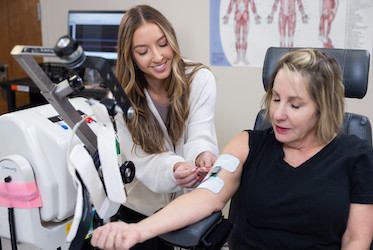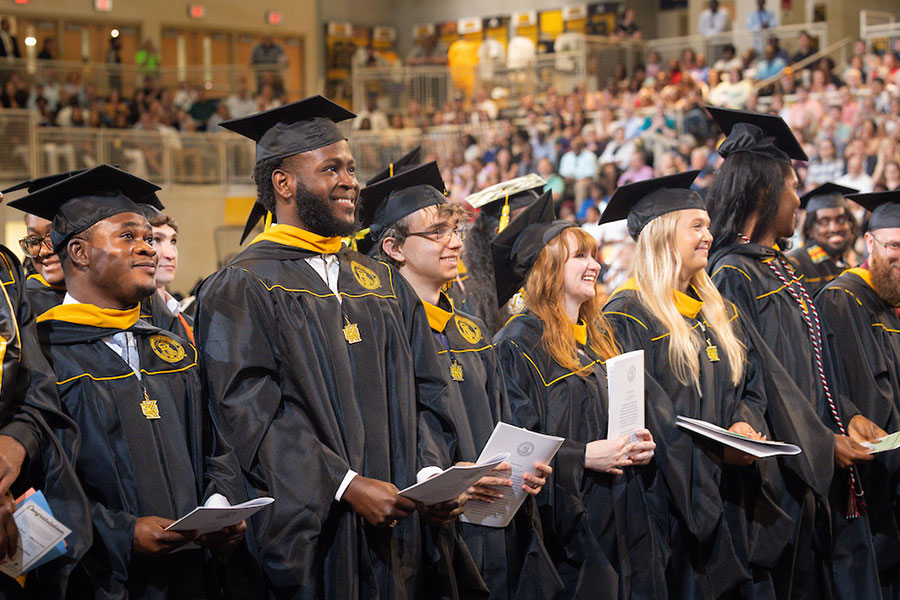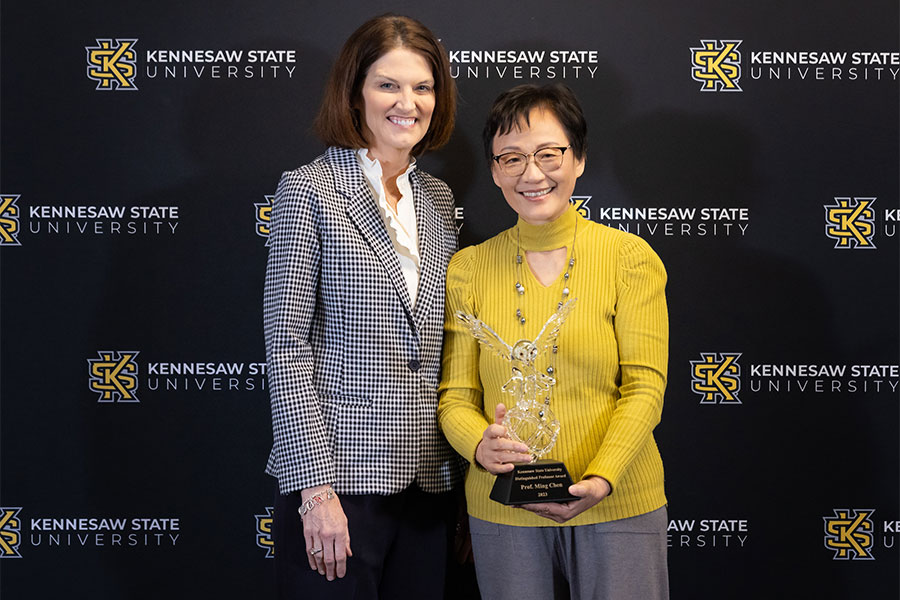
Ph.D. graduate finds niche in academia as business professor
KENNESAW, Ga. | May 4, 2020
For thousands of Kennesaw State students each semester, graduation represents a defining moment. It is an opportunity to reflect on their entire educational journey - the mentors they found, the friendships they made and the opportunities they seized. In recognition of that, we are spotlighting students who are completing their final semesters at KSU. Edwin Baidoo, who is earning a Ph.D. in Analytics and Data Science, shares what made KSU the perfect fit.

With a passion for mathematics and an analytical economic disposition, Baidoo has been serving in dual roles over the past year. While finishing his doctoral studies at KSU, he also has been working as an assistant professor of business analytics at Tennessee Technological University.
“The Ph.D. program’s emphasis on the partnership between academics and industry has really prepared me for my job as a professor and researcher,” said Baidoo. “My professors don’t shy away from the challenges of academia or industry, so when you come out of the Ph.D. program, you really have two career choices.”
Baidoo was part of the first cohort of students accepted to the doctoral program, launched in 2015 by KSU’s Analytics and Data Science Institute as the first of its kind in the U.S. Baidoo said that the program’s interdisciplinary nature helped him further define his niche in quantitative finance, which focuses on the use of mathematical structures and very large datasets to analyze financial markets and securities.
“It’s fascinating to me to read what other people have done and to see how I can contribute and have a direct impact on the issue,” he said. “In this field and in the research I have done, it’s interesting because it is a combination of three fields – mathematics, statistics and computer science.”
In fact, Baidoo’s path to quantitative finance was partially serendipitous when a recruiter came upon his resume. His bachelor’s degree in mathematics landed him a job, working at a hedge fund in New York City. A conversation with the hedge fund manager put him on the path to pursuing a master’s degree in quantitative finance, a common degree held by most of his peers.
“By this point, I was working as a market analyst, and the work I was doing was really great except that the work was not challenging enough for me,” Baidoo explained. When he decided to pursue a Ph.D., he was in Georgia at the time, and KSU had just received approval from the University System of Georgia to offer the doctorate in analytics and data science.
“As one of our first applications, Edwin immediately stood out – his academic and professional experience was at the intersection of computational finance and data science,” said Jennifer Priestley, executive director of the Analytics and Data Science Institute, who is also a professor of statistics and data science. “I knew from the beginning that he would be an excellent candidate for the program.”
Now Baidoo, whose research focus is on statistical models in the finance and insurance industry, is looking to the end of his educational journey at KSU. Having defended his dissertation in March, he became the first Ph.D. student at the university to do so virtually as a result of the COVID-19 pandemic.
Priestley added that Baidoo is also one of the first African Americans to graduate with a doctoral degree in data science. Although data science is such a nascent field, she said that there is still underrepresentation of minorities in earned doctorates in computational disciplines.
Baidoo’s dissertation research examined one of the most common problems in the finance industry – assessing the creditworthiness of individuals with little to no credit history, collectively known as the unbanked or underbanked, to predict borrower default behavior. He looked at the problem through the lens of the borrower and lender.
With a combination of traditional and alternative auto loan datasets, Baidoo’s study focused on determining the statistical and economic significance of using non-traditional credit data for these individuals when measuring credit risk. He said that the consequences of not having enough economic data often determines whether these individuals will receive higher prices of credit or be denied entirely.
“Using a maximum utility approach, I show combining alternative and traditional data in the credit modeling process yields a higher profit for the lender, rather than using either data alone,” he explained. “In terms of regulation, there is a strong interest in credit models that will inform policies on how to gradually move sections of this population into the general financial network.”
Baidoo said that this research can have an immediate impact on financial markets not only in the U.S., but also third world countries such as his home country of Ghana.
“For many third world countries, this analysis is huge because the data they have isn’t necessarily the same of how we have it in first-world countries,” he said. “So if we extend this work to third-world countries, it’s a big, big deal for them to be able to measure how creditworthy somebody is and how we trust them to do that kind of thing.”
Baidoo said he attributes his overall growth to the support and guidance he received from the professors in the program, especially Priestley, and his dissertation committee chair, Stephano Mazzotta, a professor of economics and finance in Coles College of Business.
“Dr. Mazzotta has been my mentor. He has a very strong sense of research acumen and integrity,” said Baidoo. “And every step of the way, one of my strongest supporters has been Dr. Priestley, who taught me how to make data science applicable to business, which I carry with me in my position as a professor.”
“I’m very grateful for all the experiences I have had at KSU and the opportunity I was given to be able to live my dream,” he added.
—Joëlle Walls
Submitted Photos
Related Stories
A leader in innovative teaching and learning, Kennesaw State University offers undergraduate, graduate and doctoral degrees to its more than 45,000 students. Kennesaw State is a member of the University System of Georgia with 11 academic colleges. The university’s vibrant campus culture, diverse population, strong global ties and entrepreneurial spirit draw students from throughout the country and the world. Kennesaw State is a Carnegie-designated doctoral research institution (R2), placing it among an elite group of only 7 percent of U.S. colleges and universities with an R1 or R2 status. For more information, visit kennesaw.edu.



















